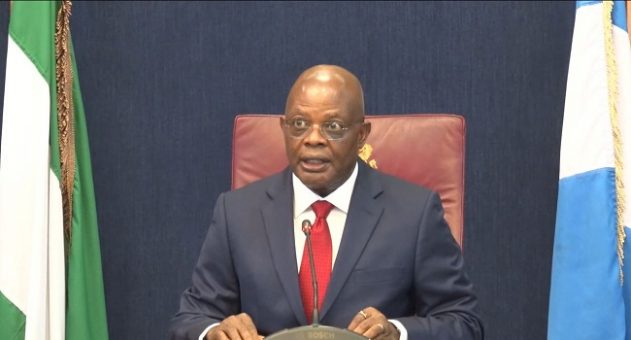Nigeria’s challenges complex but surmountable – Ibas

By Daniel Abia
The Sole Administrator of Rivers State, Vice Admiral (Rtd.) Ibok-Ete Ekwe Ibas, has expressed optimism that Nigeria’s sustainability challenges can be addressed through accountability, environmental stewardship, and strategic policy reforms.
Vice Admiral Ibas, represented by the Secretary to the State Government, Prof. Ibibia Lucky Worika, made this assertion in a keynote address during the opening ceremony of the Institute of Chartered Accountants of Nigeria (ICAN) 8th Southern Zonal Conference held in Port Harcourt.
Speaking on the theme, “Eco-Disruption and Sustainability Challenges: The Way Forward,” he said aligning professional ethics with sustainable practices—particularly in finance, governance, and environmental responsibility—is critical to national progress.
“Our world is changing. Climate change, deforestation, pollution, and unsustainable consumption patterns are no longer abstract concerns. From the rising floodwaters of the Niger Delta to the advancing desertification in the North, these issues are impacting lives, ecosystems, and economies,” he said.
While noting the importance of unconventional partnerships in tackling climate challenges, the administrator highlighted the relevance of accountants in promoting sustainability through systemic restructuring, data-driven decision-making, and adherence to ethical standards.
“In the Niger Delta, the signs of environmental stress are visible—from coastal erosion to oil pollution. These changes impact agriculture, livelihoods, and overall human well-being,” he said.
He called for a shift from extractive to regenerative systems and encouraged integration of sustainability into educational curricula and professional practices, including accounting.
“The four pillars of environmental, economic, social, and human sustainability must guide our policies. We must rethink how we account for value—beyond just financial metrics—to include ecological and social impacts,” he emphasized.
The keynote also called for stronger environmental governance, enhanced public engagement, support for clean energy, and targeted fiscal policies to facilitate green financing and ecosystem restoration.
Earlier in his remarks, the President of ICAN, Mallam Haruna Nma Yahaya, emphasized the economic potential of Nigeria’s renewable energy sector.
“If properly harnessed, the renewable energy sector can create over 300,000 jobs and contribute an estimated $7.4 billion to Nigeria’s GDP by 2030,” he said.
He added that aligning national policies with the United Nations Sustainable Development Goals (SDGs), especially Goals 7 (Affordable and Clean Energy), 12 (Responsible Consumption and Production), and 13 (Climate Action), could unlock over $1 trillion in market opportunities across Africa by 2030.
“Eco-disruption presents both a challenge and an opportunity for innovation. As chartered accountants, we can lead the sustainability agenda through improved environmental accounting, ESG disclosures, and adoption of global sustainability standards,” Yahaya said.
He also encouraged ICAN members to join the institute’s ESG and Sustainability Faculty to build capacity for leadership in the emerging green economy.
The post Nigeria’s challenges complex but surmountable – Ibas appeared first on Vanguard News.

 yarkarkara
yarkarkara 





